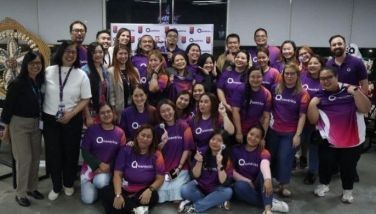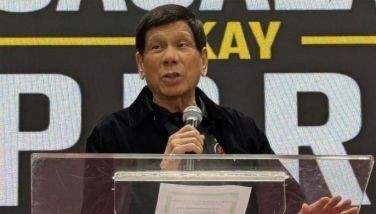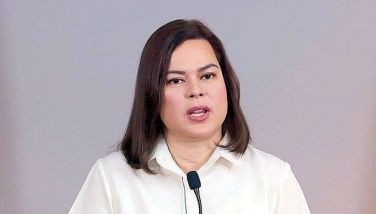No more Hiroshimas
If this column was a day late, it was due to an unexpected mishap. This article was already done and ready for sending via email in my office in MyTV, but when I left the office, I forgot to get my USB from my computer and since traffic was bad in the Gorordo area, I decided to write another column for Thursday and put this one today, a day late for the 70th anniversary of the bombing of Hiroshima.
One day and 70 years ago, the US B-29 Superfortress bomber dubbed "Enola Gay" dropped the first nuclear bomb named "Little Boy" over the city of Hiroshima at exactly 8:16AM on Aug. 6, 1945 killing around 80,000 people and wounding 35,000. A year later, another 60,000 died from the effects of the fallout or the radiation that the atomic bomb dispersed. Some say the firebombing of Tokyo five months earlier on March 10, 1945 by 134 US B-29 Superfortress bombers resulted in a bigger loss of life where some 130,000 Japanese were killed in the ensuing firestorm. From the incendiary bombs dropped from a very low altitude of 500 feet.
Three days after the bombing of Hiroshima, on Aug. 9th, another solitary B-29 bomber dubbed "Bockscar" dropped the second nuclear bomb (dubbed "Fat Man") on the city of Nagasaki, Japan's most Catholic city. Nagasaki wasn't the main objective. It was the city of Kokura, but it was cloudy over that city so they dropped the atomic bomb on Nagasaki instead also with devastating effects. Then a few days later, the Japanese military government accepted the unconditional surrender demanded by the US.
Despite the world entering the nuclear age and despite the powerful nations of the world having a huge nuclear arsenal, we can be thankful that no nation has endured any nuclear bombing since the Hiroshima and Nagasaki bombing. This is largely due to what is known as the theory of "Mutually Assured Destruction" (MAD). Meaning, any nation that drops a nuclear bomb on another nuclear-armed nation, expects a nuclear exchange or retaliation that could wipe out both nations.
Yet today a serious threat of a nuclear holocaust still haunts the world. Rogue nations like North Korea have the A-bomb and with their mentally disturbed leaders, they just might use their nuclear capability to start another war. In the US, Pres. Barrack Obama just came out to address Congress to approve the US-Iran deal that supposedly would keep Iran from having a nuclear bomb. But Israel is wary that this deal would only allow Iran to possess a nuclear bomb and use it against Israel.
In the Year 2008, my brother-in-law Yuki Kono and my sister Adela Kono invited me to go to Japan with them to bury the ashes of Yuki's mother Sachiko in the Narita Cemetery near the Narita International Airport. But the highlight of that trip was our five-hour train ride (via Shinkansen or Bullet Train) to the city of Hiroshima. That the city of Hiroshima is today a very modern city is testament to the efficiency of the Japanese government. The only scars of the nuclear bomb can be found inside the Hiroshima museum, where tourists come to visit.
While inside the museum, you can't help but notice that while the place is full of people, yet they are totally silent. The atmosphere is like being inside a church. The major artifacts of interest are photos of a wall with shadowy figures of people. They were actually real people who were walking by that wall when the nuclear bomb exploded and their bodies were instantly incinerated and their ashes imprinted on the wall. It was truly an unforgettable sight. Then we saw small bottles of medicines found inside a ruined hospital that was partly melted and fused together.
There was also a replica of the atomic bomb dubbed Little Boy and a huge map of Hiroshima before and after the explosion, which gives you an idea of Hiroshima before it was bombed and after the bomb exploded. Looking at the devastation of Hiroshima and the artifacts in the museum makes one make a solemn promise… never again should nuclear bombs fall on any city and Hiroshima is there to remind all people from all generations.
Perhaps my most unforgettable moment happened as I got out of the museum and the clock rang at exactly 3 o'clock. From the museum, I was looking directly at the A-Dome Peace Memorial Park (which calls for World Peace) with the most famous Hiroshima nuclear scar, the Gembaku Dome at the background to remind us of the horrors of a nuclear bomb.
I started praying the Chaplet of the Divine Mercy for those who died in that bombing. Believe it or not, right after praying the Chaplet of the Divine Mercy, a rainbow appeared over the Gembaku Dome, which for me was a divine sign that this type of horror would never happen again. Taking the taxi back to the train station, the driver even asked me if we saw the rainbow of the Gembaku Dome. Indeed we must cry out "No more nuclear bombs!"
* * *
For email responses to this article, write to vsbobita@mozcom.com or vsbobita@gmail.com. His columns can be accessed through www.philstar.com.
- Latest

























